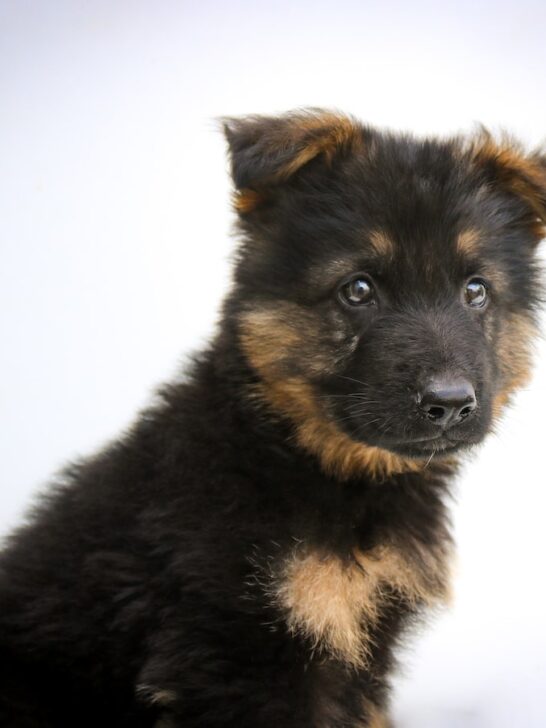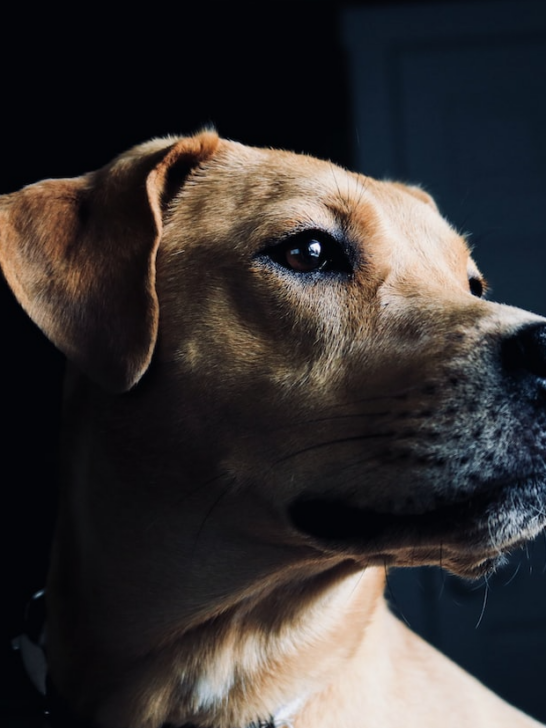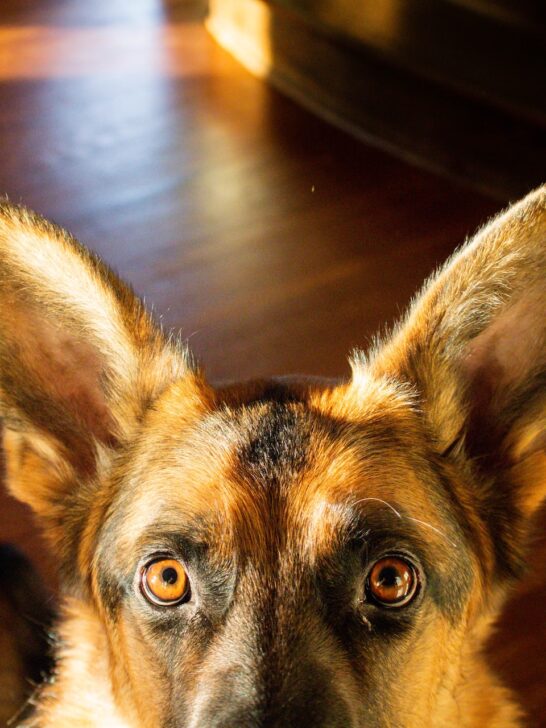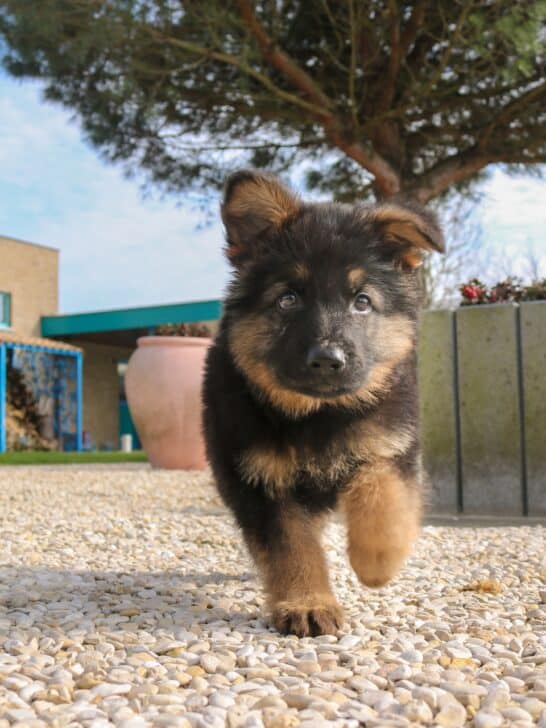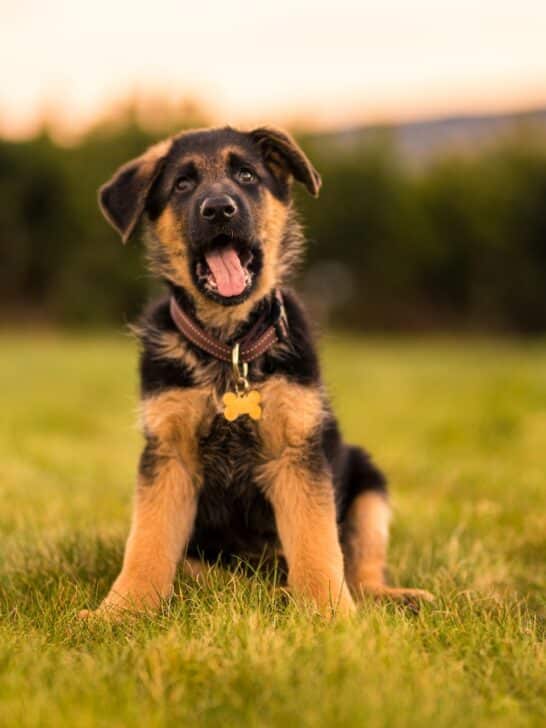Do German Shepherd Puppies Sleep a Lot?
German Shepherd puppies can sleep 15 to 20 hours per day to compensate for their quick growth and development that takes place as they catch their doggy Z’s.
As with any small living mammal, extra sleep is needed for proper growth and development.
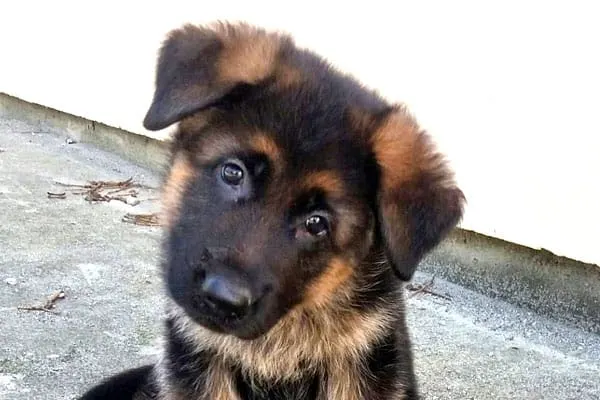
Fun Facts about German Shepherds
Before we get into more details about why German Shepherd puppies sleep a lot, here are some fun facts about your new excitable puppy:
As you learn more about your German Shepherd puppy, you should get to know the unique traits of the breed to care for him or her in more ways than just its sleep schedule.
- They are the second most popular breed in America.
- German Shepherds are an active breed that requires extensive physical and mental training to stay engaged.
- Known as a “one-man breed”, your German Shepherd will grow to be very loyal to you as his or her owner.
- Their bites have 238 lbs of force, which is close to 3 times the force of a human bite. Make sure train to your pup not to bite unless the person is an intruder.
What’s a German Shepherd Puppy’s Sleep Schedule?
A German Shepherd puppy can adopt the same routine as a human baby. Incorporate enough time throughout the day for a rotating schedule of eating, potty breaks, playing, and sleeping.
Providing a balanced and engaging schedule for your puppy will get him or her more able to become accustomed to sleep training.
Your new puppy will be getting used to their new home with you and adjusting to your sleep schedule as well.
When the pup is not playing, eating, or taking potty breaks, he or she may squeeze in a day time nap.
According to The Happy Puppy Site, it’s natural for your puppy to possibly wake up in the middle of the night for a potty break.
Their bladders are not fully developed yet, so they are always in need of a potty break.
Be prepared for your puppy to wake you up in the middle of the night the first few weeks of bringing him or her home for midnight potty breaks.
If you have multiple adults in the house, create a rotating schedule of who will take out the dog for a midnight potty break based on the day of the week.
If you have yourself and two others in your home, try a schedule like this:
- You: Sunday, Tuesday, Thursday
- Significant other, roommate, or another family member: Monday, Wednesday, and Friday
- Your older child or teenager: Saturday nights only

What Are Other Reasons for Sleeping a Lot?
There are other contributing factors as to why your German Shepherd puppy is sleeping a lot.
When they are just months old, their normal sleep schedule will be for normal growth and development of their brain, immune system, and joints.
Keep an eye on the other factors that could be reasons as to why he or she is sleeping more and adjust their environment accordingly.
Poor diet, excessive exercise, sickness, heat, and boredom could be other reasons for your puppy sleeping more than usual.
Poor Diet
You can’t just grab your favorite brand of dog food off the shelf and expect it to be hearty and nutritious enough for your very active German Shepherd puppy.
If your pup is not eating the right nutritious food, he or she could become sleepier throughout the day. Evaluate your pup’s diet to be sure you are giving it enough of what it needs to grow.
Your pup should eat protein-rich nutritious dog food specially formulated for German Shepherds.
According to Pet Care Rx, the age, activity, and general health of your pup will decide how much calories it needs throughout the day which is anywhere from 1200 to 2100 per day.
For optimum protein intake, the dog food should be 18% to 22% protein content with the right balance of vitamins, minerals, and fatty acids for your pup to grow healthy and strong.
Pet Care Rx suggests giving your pup one of the following for a balanced diet.
- Nature’s Variety Instinct Ultimate Protein Grain-Free Duck Formula Dry Dog Food
- Merrick Lil’ Plates Grain-Free Chicken and Sweet Potato Recipe with Raw Bites Dry Food
- Merrick Grain-Free Turducken Canned Dog Food
Related Post: 6 Best Dog Foods For German Shepherds
Excessive Exercise
While German Shepherds need lots of exercise to be healthy, too much exercise will make your puppy lethargic and cause him or her to sleep more.
Young puppies are still in the process of developing their bones and joints.
Excessive exercise will only tire your German Shepherd puppy out faster and repeated instances of too much exercise could mess up their sleep schedule.
The German Shepherd Shop recommends the following exercises to help your pup stay healthy.
- Limit tug of war activities to only 3-5 minutes at a time. Don’t do it often throughout the day.
- Take your puppy on small walks around the block for optimal exercise. They’re not ready to walk miles yet.
- Play fetch for about 5 minutes at a time which could be a good 4-6 throws.
- Encourage normal puppy free play with their toys at their leisure.
German Shepherd Shop discourages doing the following high-impact exercises with your pup.
- Prolonged games of fetch or tug of war
- Long hikes or walks
- Running activities
- Agility training that is not aged appropriately for your pup
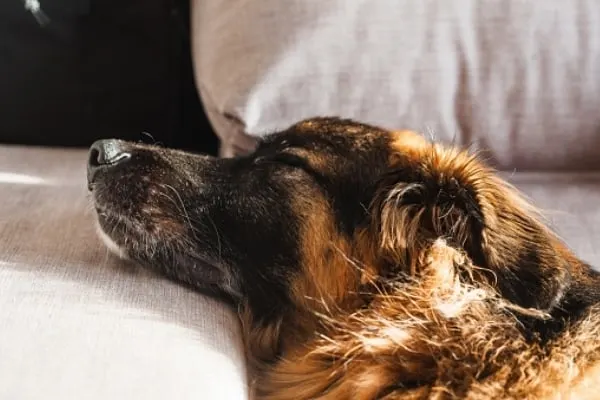
Sickness
If your German Shepherd puppy is sick, he or she may sleep more to fight off the bad bacteria and viruses. If your puppy is acting differently and not as active as usual, take note of this for repeated occurrences.
A common German Shepherd sickness is hip dysplasia which could lead to arthritis because of the continuous inflammation in the hips.
Degenerative myelopathy, bloating, blood disorders, and epilepsy are also common health issues in German Shepherds.
If your German Shepherd puppy continues to act abnormally than how he or usually behaves, schedule a visit with the veterinarian to be on the safe side.
Environment too Hot
As spring and summer roll around, watch your German Shepherd puppy’s sleeping patterns more closely.
This breed naturally thrives better in colder climates and a high amount of heat outside or inside the house can cause more sleepiness.
In the summer, be sure the air conditioner is at a comfortable temperature so your puppy feels comfortable.
In the colder months, have your heater at a mild temperature so that your puppy doesn’t get too extra sleepy.
When your puppy plays outside during a hotter day, create a shaded area for him or her to relax if you don’t have a tree that naturally creates it.
Consider placing a waterproof dog mat or bed and a dog bowl of water at this area for your pup to stay properly cool and hydrated.
If your puppy loves the snow during winter, only give him or her a few minutes of snowy playtime so they do not get hypothermia.
Your Pup is Bored
Naturally, boredom leads to sleeping more. If your pup does not have any engaging toys or activities to do, he or she may curl up in their dog bed and spend some time getting Z’s to kill off the boredom.
Yes, life can get busy, but make sure to pay attention to your pup to be sure he or she always has something fun to do when they’re not eating, sleeping, or on a potty break.
Be sure to have fun toys for your pup to play with when you’re busy doing tasks at home and play with your German Shepherd outside for optimal exercise during your free time.
Refer to German Shepherd Corner for some of the best toys for German Shepherds to get ideas of what toys to get for your curious pup. Purchase a few toys as a start and observe your pup.
Does he or she like to chew, tug, or fetch more? Maybe get one toy each that encourages these activities and see which toy your German Shepherd puppy loves most.
Once you have figured that out, you can stock up on their favorite toy for when the original one becomes worn out.
Related Posts
- 6 Best Toys For A German Shepherd
- 6 Best Chew Toys For German Shepherd Puppies
- 6 Best Bones For A German Shepherd
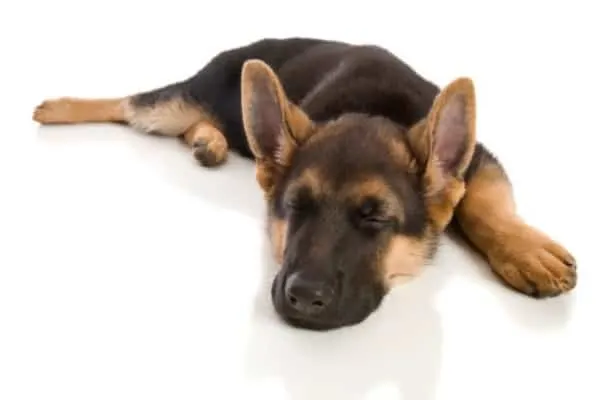
If You are Worried, Keep a Puppy Sleep Log
Keep a written journal of how much your puppy is playing and what he or she is eating. Draw up an asleep chart of your own in a notebook, create your template on the computer, or find one from a dog blogger.
The sleep chart should keep track of how much your puppy sleeps during nap, how many naps it took during the day, and the amount of time it slept during the night.
Total up the number of hours at the end of each day.
If you see an all-of-the-sudden fluctuation, analyze any changes that could have happened for your puppy’s environment.
If your puppy still sleeps more than normal, address these changes so he or she can return to their normal sleep patterns.
Once the changes have been addressed, keep track of how they affect your pup’s behavior and sleep patterns.
Conclusion
Good sleep for your German Shepherd puppy starts with age-appropriate activity and a well-balanced diet.
If you notice anything abnormal about the amount of time that your puppy is sleeping, call your veterinarian or schedule a visit just to be sure.
No matter what, nurturing your pup with all the information you’ve learned will help your pup get the sleep it needs to grow into a strong adult.
























